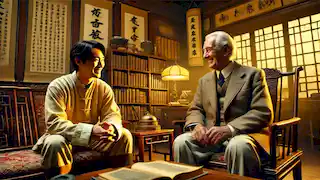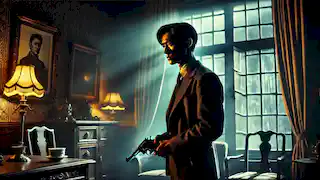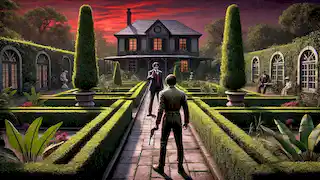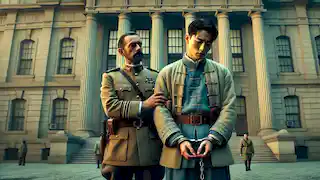The Garden of Forking Paths
Reading time: 6 min

About this story: The Garden of Forking Paths is a Historical Fiction from China set in the 20th Century This Formal tale explores themes of Wisdom and is suitable for Adults. It offers Cultural insights. A spy, a labyrinth, and the infinite choices of time.
The Garden of Forking Paths is a masterpiece of literature by Jorge Luis Borges. It is a story about time, labyrinths, and the infinite possibilities contained in every decision we make. The narrative blends elements of historical fiction, philosophical reflection, and mystery, wrapped in Borges' unique literary style. As we delve into this intricate tale, you will explore themes of destiny, paradox, and the complexity of human choice.
Dr. Yu Tsun, a Chinese professor of English, serves as the protagonist of the story. He is also a spy for the German Empire during World War I, a role that comes with its share of peril and treachery. In his desperate attempt to deliver an urgent message to his masters, Tsun faces immense pressure as his steps are constantly shadowed by Captain Richard Madden, a British intelligence officer. The chase that follows sets the stage for Tsun's journey toward an encounter that will alter the course of both their lives.
Tsun must find a way to communicate the location of a British artillery park without access to traditional communication methods. His only hope lies in an enigmatic, indirect method—a path that leads him toward a chance meeting with a man named Dr. Stephen Albert. Albert, an expert in Chinese culture and language, lives in a secluded house, where Tsun hopes to find the key to sending his message.
As Tsun travels to Dr. Albert's house, the reader learns of his ancestor, Ts'ui Pên, a governor of Yunnan who renounced his position to write a book and create a labyrinth. The story weaves together the mystery of this labyrinth and the book, which had been considered an unfinished, chaotic work of literature. However, as the tale progresses, it becomes clear that Ts'ui Pên’s creation was far more complex than anyone could have imagined.
Tsun’s journey to Dr. Albert is marked by a sense of impending doom. He knows that his time is limited, as Captain Madden is relentlessly pursuing him. The urgency of his mission heightens the suspense as he continues along the path toward Albert’s home, reflecting on his ancestor's work and the labyrinthine nature of fate itself.
At last, Tsun arrives at Dr. Albert's residence. There, he is greeted with kindness and hospitality. Albert reveals that he has been studying the writings of Tsun's ancestor, Ts'ui Pên, and has come to a remarkable conclusion. Ts'ui Pên’s labyrinth was not a physical maze, as many had assumed, but rather a conceptual one—a labyrinth of time.

Albert explains that Ts'ui Pên’s book, "The Garden of Forking Paths," is a metaphorical representation of this temporal labyrinth. The text is a narrative that presents multiple, branching realities, where every possible outcome of every decision exists simultaneously in parallel timelines. These parallel realities diverge and converge, creating an intricate web of possibilities, much like the paths in a physical labyrinth. In this framework, all potential futures, pasts, and presents coexist, allowing for infinite outcomes and experiences.
This revelation is central to the theme of the story, as it highlights the complexity of time and the notion of free will versus predestination. In the universe of "The Garden of Forking Paths," each choice made by an individual leads to a different reality, but all of these realities exist concurrently. Therefore, no choice is ever truly final, and every possibility is real in its own way.
As Tsun listens to Albert's explanation, he realizes that this revelation is the key to completing his mission. The name of the village where Albert lives, "Albert," is the code Tsun needs to relay to his German masters. By killing Albert and making the news of the murder known, Tsun can send the message in a way that is seemingly unrelated to espionage but still effective. The location of the artillery park is hidden in the name "Albert."

Tsun wrestles with his conscience as he contemplates what he must do. Albert, a kind and intellectual man, has welcomed him into his home and shared profound insights into the nature of time and reality. Yet, Tsun knows that in order to fulfill his duty, he must kill this man. In this moment, Tsun himself is caught in the web of forking paths—he can choose to act on his mission or spare Albert’s life, but each decision leads to a different outcome in a different reality.
Ultimately, Tsun shoots Dr. Albert, completing his mission. The murder is reported in the newspapers, and Tsun’s message is successfully conveyed to the German military. Despite his success, Tsun is arrested by Captain Madden shortly after committing the murder. The story ends with Tsun awaiting execution, reflecting on the paradoxes of time, choice, and consequence.

The brilliance of "The Garden of Forking Paths" lies in its exploration of the infinite possibilities that stem from every action. Borges masterfully intertwines the philosophical and the narrative, creating a story that challenges the reader to think about time, reality, and the nature of existence. In this universe, every choice we make leads to a new set of possibilities, each as real and valid as the others. The labyrinth, both literal and metaphorical, serves as a symbol of the complexity of life and the endless paths we can take.
The story suggests that while we may perceive time as linear, with a past, present, and future, it is in fact much more complex. The choices we make ripple through an infinite web of possibilities, and though we may not be able to see or understand every path, each one exists in its own right. The tale invites the reader to contemplate the implications of this idea—what if every decision we made resulted in a different version of our lives, one that exists parallel to the one we know?

In the end, "The Garden of Forking Paths" is not just a story about espionage or murder—it is a story about the nature of time and the human condition. Borges, with his characteristic brilliance, uses the narrative to explore profound philosophical questions, leaving the reader to ponder the infinite possibilities that lie within every moment of existence. The labyrinth of time, as described by Borges, is both a blessing and a curse, offering endless potential but also endless uncertainty. As Tsun walks his own path through the labyrinth, he becomes a symbol of the choices we all face and the realities that could unfold from them.
Conclusion
The Garden of Forking Paths is a literary labyrinth in its own right, with each layer revealing deeper truths about time, reality, and choice. Through the character of Yu Tsun and the metaphor of the labyrinth, Borges creates a story that lingers in the mind long after the final page is turned. As the reader contemplates the infinite paths that life can take, they are reminded that every decision holds the potential for a new world, waiting to be explored.


















